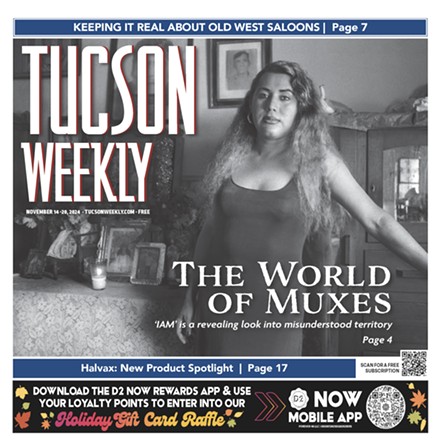Emma Hughes-Juan used to hate the sound of her own voice, but a program called Girls Making Media helped her not only grow to appreciate her voice; it made her feel like she could pretty much do anything. The 17-year-old recently finished participating in Girls Making Media, taking with her numerous technical media skills. There's a video showcase at 1 p.m., Saturday, April 30, at the Screening Room, 127 E. Congress St., to celebrate the videos created by participants. For more information and to see what Hughes-Juan and other participants created, visit girlsmakingmedia.com.
How did you find out about the program?
From my mother, when (Girls Making Media) first started a couple of years ago. My mother is on the (Pima County/Tucson) Women's Commission, and the commission is a sponsor. She thought I'd be interested.
Did you have any expectations when you first started?
Not really. I just thought I was going to go to an after-school program, and probably would not get anything out of it. But I was wrong.
What made you keep going?
At first, I liked that it was a small group and a one-on-one kind of thing. They really work with you and help you think about how to create a message, and dig deep to get you to think of what you want to talk about. They want you to open up. I was a little hesitant to open up. The ideas were to create media on women's issues. I had to think of what issues I wanted to discuss.
What issues did you learn about?
I believe the first project I did was on women and sports, and how, for a while, they wouldn't let women play sports. I also did a video on women in aviation, because I have an interest in aviation. I didn't know a lot about women in aviation. It was great just doing the work to find out that information.
You're going to be going to college soon. What are your plans?
I'm going to go to college for film production. I won't have as much of a hand in Girls Making Media as I used to, although I'd like to still be part of it.
What did you get out of the program?
Definitely a lot of confidence, and I got a lot of motivation. When I first started, (on) the first video, I had to record my voice. I was very nervous hearing my voice. It was something that really bothered me. I don't like hearing my own voice. To hear other people say, "You're doing fine. Your voice sounds good," felt great. I'm very used to it now. And I got more motivation to do more things as a young woman—to just get out there.
Is the program the reason you want to study film production?
Yeah, it is.
What do you want to do in film?
My interest is documentary films, so I'd love to do (documentaries) on women, and how they got where they are, and how they were able to accomplish (what they've done). I'm Native American, too, and that's an area I'd like to look at more.
Why is it important to focus on girls and women?
A lot of young girls think everything is equal, but it's not. Women today think there is equal pay, but after we did a video on pay equality, I was even surprised to hear (that's not the case). Here I am at 17, and I thought everything is equal, but it's not.
What was your favorite part?
Learning the technical stuff, but I really liked leading the other girls to get them to work on their stories and see the stories they come up with. There was one 9- or 10-year-old girl who did one on beauty. I was surprised to see this 9- or 10-year-old girl have so much to say, and at that young age to have so much concern on self-image.
What would you tell other girls to get them involved?
I'd want to tell them how the program works and how fun it is. I really liked it, and what I really liked was that it gives you a voice. Even if it is just a short video, you can be completely anonymous, but it gives you a voice.
What's important about finding your voice?
It's a chance to be heard—for young girls especially, to know they can be out there and be outspoken and stand out and have a say in things, no matter what. That's important.




